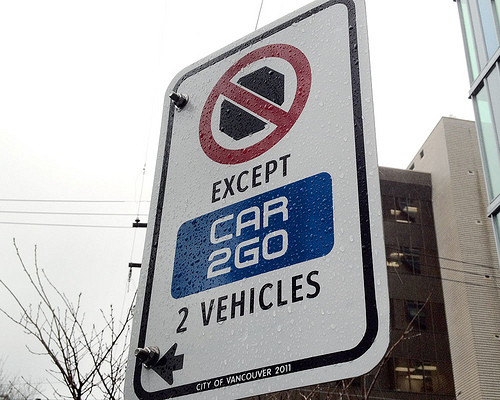How ridesharing and carsharing insurance works
Carshare and rideshare companies aren’t just changing the way people get around; they’re forcing changes in how auto insurance operates. Geico has begun offering a commercial insurance policy tailored for Uber, Sidecar and Lyft drivers in the state of Virginia. A source explained to BuzzFeed: “It is a year-long commercial auto policy… but like any of our commercial products, we’ve designed it to cover personal and commercial use of any vehicles on it — replacing the personal policy and thus creating the seamless insurance coverage that no one else can offer yet.”

The insurance industry is developing coping mechanisms for the millions of vehicles used in ridesharing and carsharing programs. Image from Richard Drdul.
Passengers might request the same destination, but ridesharing is different than hopping in a taxi. As the National Association of Insurance Commissioners explains, “Limos and taxis have been licensed by the state and/or local transportation authority to provide a livery service, or to transport passengers for a fee. The vehicles are inspected, and drivers must be properly licensed. Taxi operators are required to have insurance that protects a passenger and third parties, such as pedestrians or other drivers, should the taxi be involved in an accident that causes bodily injury or damage.” Yet in many states, rideshare companies are not subjected to the same license and insurance requirements that typical taxi and limo providers are.
Take ridesharing company Uber, which had previously deactivated a dozen or more California drivers who had registered their cars as commercial vehicles, necessitating commercial insurance. Commercial insurance is notably costlier than personal insurance, and, as BuzzFeed notes, companies like Uber and Lyft may have a lot to lose: “[A]ny requirement for ride-hail drivers to register as such could pose a threat to the business models of Uber and Lyft — which, in many states, depend on a pool of part-time or more casual drivers using their personal vehicles.”
The new Geico policy will cover Virginia drivers when they are driving their customers and when they are driving privately. (Request a quote for a vehicle in Virginia on Geico’s site, and you’ll find the option “Ridesharing (ex: Uber or Lyft)” under the “Type of Business Use” drop-down menu.) While the insurance is now only available in Virginia, it may next be offered in Maryland. The cost will be in the range between private and commercial insurance costs.
“I can tell you prices are decent, nowhere near as expensive as taxi coverage but a little pricier than personal auto — the trade-off is seamless coverage between Uber/Lyft work and personal use,” the Geico source explained to BuzzFeed. “The downside is we’ll probably never be filed in NY to be able to offer TNC/TLC insurance in NY — the filing is too stringent for the conservative company to want to go through.”
Currently, Uber riders who use the services UberBLACK, UberSUV or UberTAXI are protected by their drivers’ commercial insurance policy “in at least the minimum amount required by local regulations,” according to the company. However, if you ride with UberX, the service run by drivers using their own vehicles — and the crux of the company’s offerings — there is no commercial insurance. Such drivers have personal insurance policies. Lyft currently offers an admittedly complicated insurance policy, with four coverages: contingent liability; primary automobile liability; contingent comprehensive & collision; and uninsured/underinsured motorist coverages.
Sidecar’s policy covers driver liability for bodily injury and property damage to passengers and third parties up to a million-dollar maximum, with coverage starting when a driver has accepted a ride through the smartphone app and ending when the driver completes the transaction or when the ride is complete. Additional coverage is offered in Washington state, California, and Chicago, Illinois; plus, $50,000 in collision insurance for Sidecar drivers is included in every area where the app is available. Carsharing company Car2go has a policy which varies by state; for example, certain Car2go members (such as those in Oregon and Washington) are not covered with personal injury protection, while Washington DC members are offered personal injury protection at DC’s statutory limit.
These current insurance complications raise a key question: How will the self-driving cars of the near-future impact insurance? As the Insurance Information Institute notes, most accidents are attributable to driver error, so “if this factor can be minimized by taking control of the moving vehicle away from the driver, the accident rate should tumble.” Data shows that autonomous features like forward-collision warning systems have already led to a drop in property damage liability and collision claims.
The Institute predicts that liability coverage will remain necessary (though that coverage could change) while coverage for physical damage is not as likely to change, but could become less pricey. Other claims may continue to drop with the advent of self-driving cars: “The number of vehicle-related workers compensation claims, now responsible for a large but decreasing portion of claim costs… should continue to drop as will the share of healthcare and disability insurance costs related to auto accidents.”
Are you a ridesharing or carsharing driver or passenger? Get informed: contact your state’s insurance department for more information on the regulations in your area.
Related Posts
Category: Transportation

















